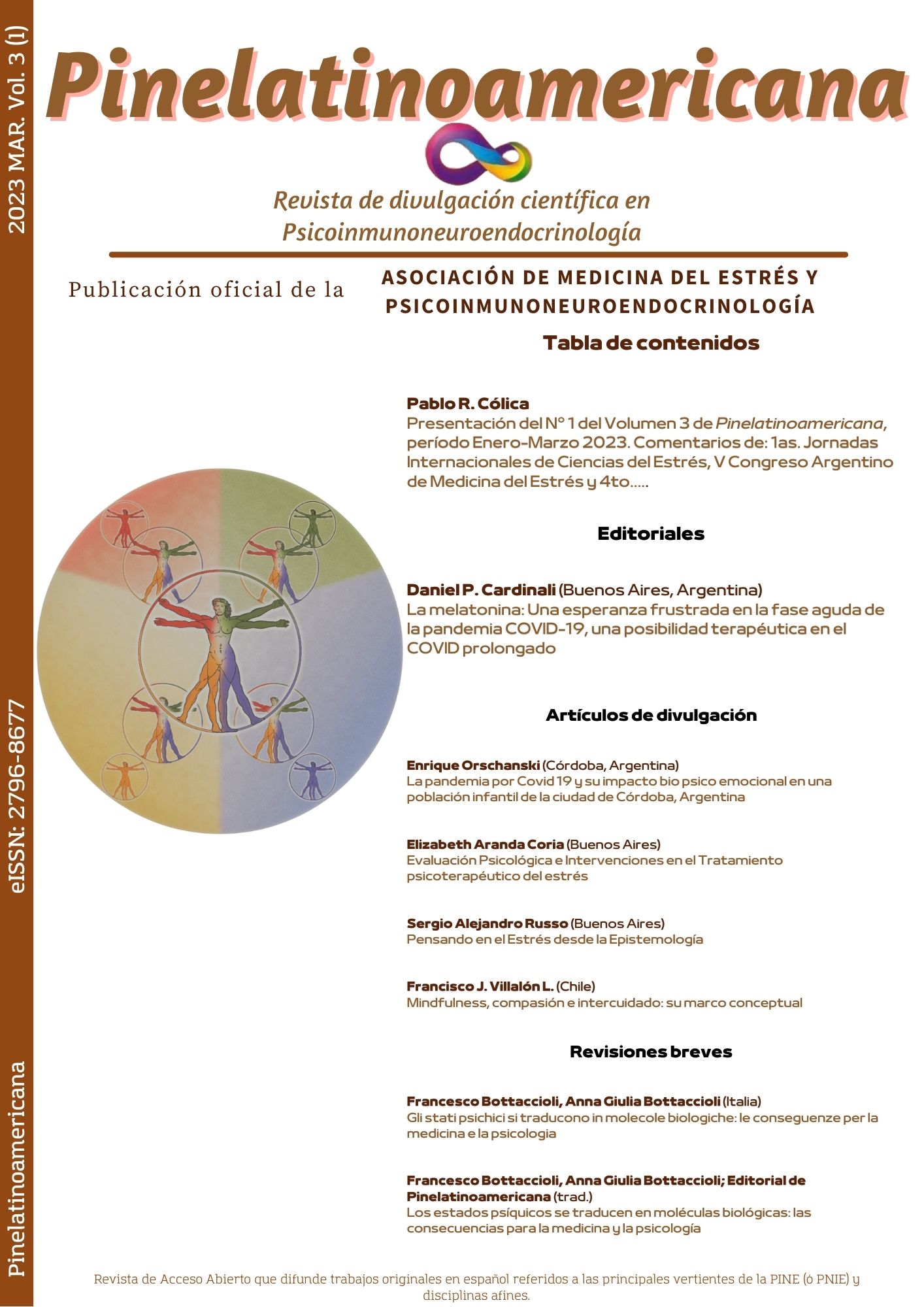Abstract
Mindfulness has spread in recent years in different fields, including health, education and organizations. Also in response to instrumentalization, the dimension of compassion has been explicitly incorporated. This increase has presented a development of the body of knowledge including its definition, measurement and the effect of programs based on mindfulness or compassion at the physical, psychological, social and neurobiological levels. The rich history and scientific growth presents a diversity of programs focusing on different populations, meditation practices, exercises, teachings and duration. Also, this progress has allowed the detection of adverse effects, difficulties in the evaluation along with opportunities for improvement to continue the development of knowledge. The purpose of this article is to orient a conceptual framework of the main findings of the decade, to guide relevant elements for evaluation, dissemination and decision making, along with opportunities to build in Latin America a body of knowledge and application with cultural relevance and sensitivity.
References
Ashar, Y. K., Andrews-Hanna, J. R., Dimidjian, S., y Wager, T. D. (2016). Toward a Neuroscience of Compassion en J. D. Greene, I. Morrison, y M. E. P. Seligman (Eds.), Positive Neuroscience (pp. 125-142). Oxford University Press. https://doi.org/10.1093/acprof:oso/9780199977925.003.0009
Bishop, S. R. (2004). Mindfulness: A Proposed Operational Definition. Clinical Psychology: Science and Practice, 11(3), 230-241. https://doi.org/10.1093/clipsy/bph077
Britton, W. B., Lindahl, J. R., Cooper, D. J., Canby, N. K., y Palitsky, R. (2021). Defining and Measuring Meditation-Related Adverse Effects in Mindfulness-Based Programs. Clinical Psychological Science, 216770262199634. https://doi.org/10.1177/2167702621996340
Cebolla, A., Galiana, L., Campos, D., Oliver, A., Soler, J., Demarzo, M., Baños, R., Feliu-Soler, A., y Garcia-Campayo, J. (2017). How Does Mindfulness Work? Exploring a Theoretical Model Using Samples of Meditators and Non-meditators. Mindfulness, 9. https://doi.org/10.1007/s12671-017-0826-7
Crane, R. S., Eames, C., Kuyken, W., Hastings, R. P., Williams, J. M. G., Bartley, T., Evans, A., Silverton, S., Soulsby, J. G., y Surawy, C. (2013). Development and Validation of the Mindfulness-Based Interventions – Teaching Assessment Criteria (MBI:TAC). Assessment, 20(6), 681-688. https://doi.org/10.1177/1073191113490790
Davids, T. W. R. (1881). Buddhist suttas. Clarendon Press. https://babel.hathitrust.org/cgi/pt?id=hvd.ah6594&view=1up&seq=6
Farias, M., Brazier, D., y Lalljee, M. (2021). The Oxford Handbook of Meditation. Oxford University Press.
Ferrari, M., Hunt, C., Harrysunker, A., Abbott, M. J., Beath, A. P., y Einstein, D. A. (2019). Self-Compassion Interventions and Psychosocial Outcomes: A Meta-Analysis of RCTs. Mindfulness, 10(8), 1455-1473. https://doi.org/10.1007/s12671-019-01134-6
García Campayo, J., y Demarzo, M. (2018). ¿Qué sabemos del mindfulness? (1a ed). Editorial Kairós SA.
Gilbert, P. (2010). Compassion Focused Therapy: Distinctive Features (1a ed). Routledge.
Goldberg, S. B., Riordan, K. M., Sun, S., y Davidson, R. J. (2022). The Empirical Status of Mindfulness-Based Interventions: A Systematic Review of 44 Meta-Analyses of Randomized Controlled Trials. Perspectives on Psychological Science, 17(1), 108-130. https://doi.org/10.1177/1745691620968771
Gonzalez-Hernandez, E., Harrison, T., y Fernández-Carriba, S. (2019). A Program of Cognitively-Based Compassion Training.
Howarth, A., Smith, J. G., Perkins-Porras, L., y Ussher, M. (2019). Effects of Brief Mindfulness-Based Interventions on Health-Related Outcomes: A Systematic Review. Mindfulness, 10(10), 1957-1968. https://doi.org/10.1007/s12671-019-01163-1
Lang, P. (2022). Empatía, intuición y cognición en el proceso terapéutico de adultos mayores. Pinelatinoamericana, 2(3), 194–202. https://revistas.unc.edu.ar/index.php/pinelatam/article/view/39248
Tang, Y. Y., Hölzel, B. K., y Posner, M. I. (2015). The neuroscience of mindfulness meditation. Nature Reviews Neuroscience, 16(4), 213-225. https://doi.org/10.1038/nrn3916
Van Dam, N. T., van Vugt, M. K., Vago, D. R., Schmalzl, L., Saron, C. D., Olendzki, A., Meissner, T., Lazar, S. W., Kerr, C. E., Gorchov, J., Fox, K. C. R., Field, B. A., Britton, W. B., Brefczynski-Lewis, J. A., y Meyer, D. E. (2018). Mind the Hype: A Critical Evaluation and Prescriptive Agenda for Research on Mindfulness and Meditation. Perspectives on Psychological Science, 13(1), 36-61. https://doi.org/10.1177/1745691617709589
Van Gordon, W. y Shonin, E. (2020). Second-Generation Mindfulness-Based Interventions: Toward More Authentic Mindfulness Practice and Teaching. Mindfulness, 11(1), 1-4. https://doi.org/10.1007/s12671-019-01252-1
Villalón, F., Escaffi, M. y Correa, M. E. (In press). Validación de la escala Self Compassion Scale Short Form en profesionales y estudiantes de medicina en Chile. Revista médica de Chile.
Villalon, F., Mundt, A. y Escaffi, M. (In Press). Validación de la escala Five Facets of Mindfulness Short Form en estudiantes y profesionales de medicina en Chile. Revista médica de Chile.
Zhang, D., Lee, E. K. P., Mak, E. C. W., Ho, C. Y., y Wong, S. Y. S. (2021). Mindfulness-based interventions: An overall review. British Medical Bulletin, ldab005. https://doi.org/10.1093/bmb/ldab005
Zhang, L., Lopes, S., Lavelle, T., Jones, K. O., Chen, L., Jindal, M., Zinzow, H., y Shi, L. (2022). Economic Evaluations of Mindfulness-Based Interventions: A Systematic Review. Mindfulness, 13(10), 2359-2378. https://doi.org/10.1007/s12671-022-01960-1

This work is licensed under a Creative Commons Attribution-NonCommercial 4.0 International License.
Copyright (c) 2023 Pinelatinoamericana

